Dhruv belonged to a poor family. His father was a labourer and his mother worked as a maid. Dhruv wanted to go to school but his father didn’t have money for his education. He barely earned enough to buy food.
Dhruv didn’t understand this. He really wanted to go to school.
“Papa, when will I go to a school? All other children my age go to school. I wish to go too. Even I want to have a school bag, a pen, a notebook. I hate picking trash,” sobbed Dhruv.
“Dhruv, going to school is expensive. How am I going to buy you a uniform or books? I don’t earn enough to send you to school. When I earn more, I will surely send you to school,” replied Papa.
“You have been saying that for the last two years. I’m nine years old now. When will I go to school? I want to know how to write my name” said Dhruv, in between sobs.
“I will do something about it very soon,” said Papa and left for work.
Dhruv was sad. His dream would never come true. His father could not do anything and neither could he.
He took his bag and dustpan and left to collect garbage from the street corners.
He had a couple of friends who used to collect garbage with him. Dhruv did not like them much. They always fought and Dhruv hated that. They used to make fun of Dhruv since he always talked about studying.
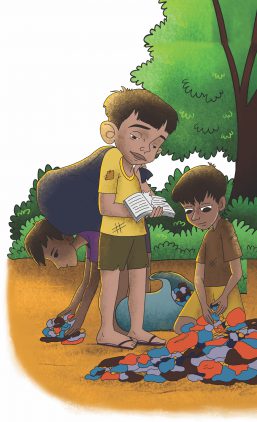
They would say, “Dhruv is only interested in education like rich people. Poor people shouldn’t care about education.”
But Dhruv wished to study. He wanted to be successful in life and do something so that no child had to live like him.
One afternoon, Dhruv saw a balloon seller. He was filling gas in the balloons that rose and flew high in the sky.
Dhruv saw a mother buy a balloon for her daughter who was crying. She said, “Don’t cry, Sakshi. Take this balloon! It flies very high!”
Sakshi took the balloon and wiped away her tears immediately. She was happy and played with her balloon.
Dhruv thought the balloon wipes away sadness and maybe it could help him find a way to go to school so that he wouldn’t be sad.
He had some money in his pocket and went to the balloon seller to buy a balloon.
He asked the balloon seller, “Will this balloon make me happy?”
“Of course! It makes everyone happy! It can fly very high, even higher than the sky. It costs five rupees only,” said the balloon seller.
“Please be honest. Will this make me happy?” asked Dhruv.
“I’m saying nothing but the truth. This balloon goes very high in the sky,” the balloon seller replied.
A teacher was listening to this conversation. He too was buying balloons for his children. He found Dhruv’s questions interesting.
The teacher asked Dhruv, “Why are you asking the seller such questions?”
“I want to be happy and the only way I can be is if I study. This balloon made that girl happy so I’m sure if I buy it, I may find a way to go to school and be happy,” said Dhruv, full of hope.
“Is that so?” the teacher inquired.
“Yes, I wish to go to school like other children. Even I want to study. Does being poor mean I have no right to get an education?” Dhruv asked, tearfully.
“Don’t worry, boy. You will start going to school very soon,” the teacher said, gently placing his hand on Dhruv’s head.
“But I haven’t bought the balloon yet,” said Dhruv, confused.
“Don’t worry, my dear boy. I am a teacher at a school nearby. Now tell me, where is your home? Take me there. I will talk to your family about sending you to school,” the teacher told Dhruv.
Dhruv was overjoyed. He and the teacher walked to his house.
“Our government provides free education to poor children. You should send Dhruv to a government school. You won’t have to pay fees. And if there’s any other expense, related to education like tutoring or buying more books, I will pay for the other expenses. You need not worry about anything,” the teacher explained.
Dhruv’s parents were delighted to know that. They didn’t know that school admission was free. With the help of the teacher, they completed Dhruv’s admission process.
After a few days, Dhruv started going to a nearby school. He didn’t have to collect garbage anymore. He was happy and started studying with dedication.
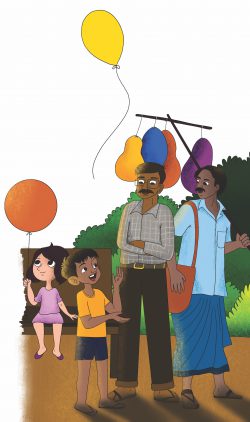



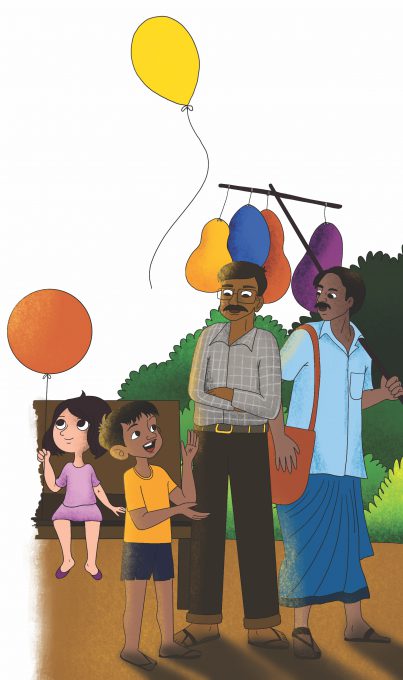




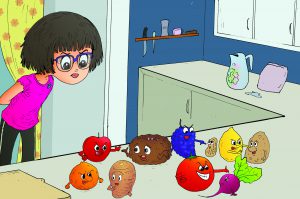
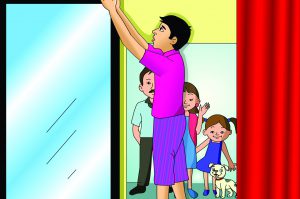


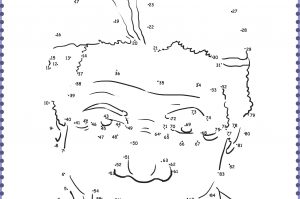

COMMENT